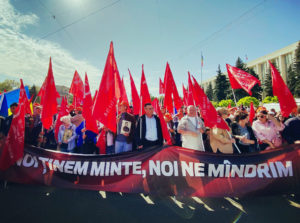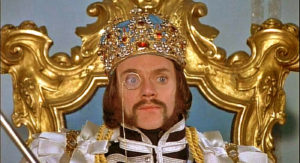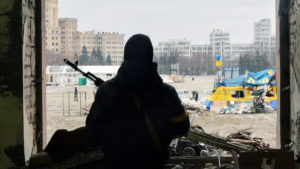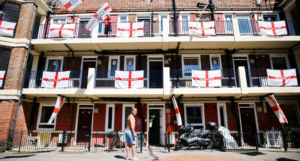Putin’s aggressive war on Ukraine may have had the unintended consequence of reviving a moribund Nato alliance, but for many liberals, that isn’t enough. Just as the war saved Johnson from seemingly inevitable ejection from Downing Street, so have defenders of the sclerotic liberal order seized on Ukraine’s valiant defence of its territory and people to borrow lustre for their own tarnished project. In the post-liberal writer Sohrab Ahmari’s telling, the war “offered a gleaming opportunity for elite ideological reconciliation in the West”, as liberals and nationalists in Europe and Washington tentatively made peace with each other against the threat of Russian imperialism.
Indeed, the world has been turned upside down: liberal pundits bedeck their Twitter profiles with blue and yellow bunting, declaring the inviolability of Ukraine’s borders, while self-styled American nationalists make sympathetic excuses for the revanchist ambitions of Russia’s sprawling, multiethnic empire. So is nationalism acceptable again in polite society?
The belief that there is such a thing as a Ukrainian people, who speak a Ukrainian language and are the shared heirs to a common Ukrainian culture, and who therefore have the right to self-governance in an independent Ukrainian nation state is by definition a nationalist statement. That is what nationalism is: in the anthropologist and theorist of nationalism Ernest Gellner’s pithy definition, “nationalism is primarily a political principle, which holds that the political and the national unit should be congruent”.
Furthermore, for Gellner, “if the rulers of the political unit belong to a nation other than that of the majority of the ruled”, for example, “through the incorporation of the national territory in a larger empire” (as would be the case if Ukrainian-populated territories were absorbed by conquest into the Russian Federation), “this, for nationalists, constitutes a quite outstandingly intolerable breach of political propriety”. By this definition, most people reading this would be nationalists — or Ukrainian nationalists by proxy — and rightly so: it offends our basic moral sense of how things should be that Putin could decide otherwise.
Yet nationalism has become, in recent decades, an unfashionable doctrine. A product of 18th and 19th-century liberalism, which aimed to liberate the small peoples of Europe from the grip of sclerotic empires either unresponsive to their needs or directly oppressive, nationalism became taboo after the Second World War, following the destruction wrought by Nazi German and Italian imperialism on the European continent.
A meaningless folk distinction between “nationalism” and “patriotism” has become current among many non-academic pundits, in which “nationalism” is simply “patriotism, but bad” and “patriotism” merely the safely-neutered version of nationalism. This seemingly derives from Orwell’s essay Notes On Nationalism, in which the requirement of a jobbing journalist to churn out copy on time has been granted an afterlife far longer than it deserves. The fact that Orwell’s primary examples of “nationalism” in the essay are Communism and political Catholicism indicates the analytical uselessness of his definitions: then as now, “nationalism”, like “fascism”, is just a catch-all descriptor for things the writer happens to dislike.
At a slightly higher level, much of the debate on nationalism — and the certainty that it is both a bad thing and a superseded relic of a destructive past — derives from the “Modernist thesis” of its origins. This was most notably put forward in the Seventies and Eighties by Eric Hobsbawm, Ernest Gellner and Benedict Anderson, the last of whose book, Imagined Communities, is probably only matched by Edward Said’s Orientalism for its deleterious effects on political discourse through skim-reading by lazy undergraduates.
There is not the space in this essay to adequately deconstruct the Modernist thesis on the origins of nationalism (interested readers should turn to Anthony D. Smith’s Nationalism and Modernism for that), but to summarise: rather than nationalism being a product of the political aspirations of pre-existing nations, nationalism creates nations, as social elites elevate aspects of peasant folk cultures into a never-before-existing high culture with political secession from a multiethnic imperium as their goal.
As the historian Richard Drayton notes in a recent essay historicising the Modernist turn: “Since around 1980 social constructionist views of nationalism have been predominant, seeing it as principally artificial, as invented tradition, a fictive relationship of ethnicity to culture to territory to political destiny propagated by manipulative elites who are the beneficiaries of imagined communities and the nation state.” This is the hegemonic understanding of nationalism among the educated classes of the West, through dissemination of the Modernist thesis through university education.
Yet as Smith notes sadly of Anderson’s reception, “the postmodernist reading, and its accompanying cultural analysis, can always be detached from its modernist moorings”. Anderson’s focused emphasis on print capitalism has been sidelined, and instead it is “the role of imagination, and the idea of the nation as a discourse to be interrogated and deconstructed, that have proved most influential… developed by the many theorists in the postmodernist traditions who have drawn their inspiration from a partial reading of Anderson’s work.”
The “imagined community” is thus misread as an imaginary one, an entirely fictional construct of political elites with little basis in reality. As Smith notes, both Gellner and Hobsbawm agreed, to differing degrees, that nationalism required some pre-existing sense of social or ethnic cohesion to work, and “with the exception of Hobsbawm, most modernists have in fact been reticent about the fate of the national state and the prospects of nationalism. It has been left to so-called ‘postmodernists’ to proclaim the demise of the ‘nation state’ through an overwhelming combination of political dependence, economic globalisation, mass communications and cultural hybridisation.”
This position reaches its most debased and vulgar downstream form in the iconoclastic glee with which, say, British Twitter liberals race to inform us each April 23 that actually St George was a Palestinian refugee or Turkish immigrant or whatever they deem most shocking to their notional English nationalist readers. Surely now, newly-armed with this brave puncturing of national-mythmaking, the backward old certainties must fall away, with the harrumphing major or knuckle-tattooed yob finally accepting, chastened, the borderless utopia of global liberalism? This is, sadly, the intellectual terminus of the Modernist thesis.
Yet the Twitter liberals share a most unlikely ally in what they view as their iconoclastic deconstructing of the nation state, and its petty myths: Putin himself. In his rambling 2021 essay On the Historical Unity of Russians and Ukrainians, Putin adopted the tropes of the Modernist thesis to prove his contention that the Ukrainian nation has no rightful existence outside Russia’s embrace.
Putin begins by emphasising the diverse origins of the “Slavic and other tribes” across the ancient Rus state, united by shared dynastic rule and latterly a common language and faith. He emphasises the ethnic and linguistic diversity of the Ukrainian lands, noting that: “the south-western lands of the Russian Empire, Malorussia and Novorossiya, and the Crimea developed as ethnically and religiously diverse entities. Crimean Tatars, Armenians, Greeks, Jews, Karaites, Krymchaks, Bulgarians, Poles, Serbs, Germans, and other peoples lived here.”
Yet over time, as in Gellner and Hobsbawm’s narrative of nationalist development, “the idea of Ukrainian people as a nation separate from the Russians started to form and gain ground among the Polish elite and a part of the Malorussian intelligentsia. Since there was no historical basis and could not have been any, conclusions were substantiated by all sorts of concoctions,” including elevating folk dialects into a standardised Ukrainian language. In Putin’s Modernist theory of Ukrainian nationalism, Ukrainian elites, through the logic of seeking their own advancement, created a Ukrainian nation where none had existed before, just as Gellner characterises the ideal nationalism of his fictional Ruritania.
Just like Hobsbawm, Putin blames Lenin’s Nationality Policy for invigorating nationalist sentiment among Russia’s subject peoples, claiming that the 1924 Constitution “planted in the foundation of our statehood the most dangerous time bomb”, while warning that Ukrainian nationalism is forcing “the path of forced assimilation, the formation of an ethnically pure Ukrainian state” in “a country, as I have already noted, that is very complex in terms of its territorial, national and linguistic composition, and its history of formation”.
The Modernist thesis on nationalism, and on the fraudulent novelty of the nation state, is thus put to effective use for Russian imperialist purposes. We can argue further that the Modernist thesis is tacitly imperialist, in that it views nationalism as a destructive innovation with broadly deleterious effects, compared with the benign patchwork of faiths and languages in the empires that preceded it. Both Hobsbawm and Gellner were born in the wreckage of the multiethnic Habsburg Empire, and both preferred it to what followed, in their cases quite rationally: both fled the rise of the Nazis for England and academia (Anderson, from an aristocratic Anglo-Irish background like his brother Perry, also had a complicated family relationship with nationalism).
In Hobsbawm’s case — he would write to a friend that “I remain in the curious position of disliking, distrusting, disapproving and fearing nationalism wherever it exists” — the latent imperialism of the Modernist thesis in general (which by highlighting the novel, unnatural nature of nationalism makes its predecessor “natural” by default) was made explicit. He regretted the collapse of the Soviet Union, remained one of its last supporters in British intellectual life, and would inform an audience of Budapest students in 1993 that “although many of you will not welcome my saying so, that up to a point [the USSR] worked better than anything since the break-up of the monarchies in 1918. For the common citizens of the more backward countries in the region — say Slovakia and much of the Balkan peninsula — it was probably the best period in their history”.
It’s worth noting here that Hobsbawm wrote in to the Daily Worker on the topic of the USSR’s crushing of the 1956 Hungarian Uprising to say that “While approving, with a heavy heart, of what is now happening in Hungary, we should therefore also say frankly that we think the USSR should withdraw its troops from the country as soon as this is possible.” Perhaps we can therefore term him a moderate, even conservative imperialist. On the topic of Ukraine, he would note that “Ukraine remained relatively quiet while Baltic and Caucasian republics demanded secession, remained under the control of the local Communist Party leadership, and did not resign itself [my emphasis] to separation until after the failed coup of August 1991 destroyed the USSR”. As does Putin, Hobsbawm emphasises that “Russians, in the nineteenth century, regarded themselves as Russians, and this included many Ukrainians and Belorussians, today zealous defenders of their national identity.”
Observing Europe after the collapse of the Soviet Union, he warned that “the eggs of Versailles and Brest-Litowsk are still hatching”. For Hobsbawm, “the permanent collapse of the Habsburg and Turkish empires and the short-lived collapse of the Tsarist Russian empire produced the same set of national successor-states with the same sort of problems” leading inexorably to “mass murder or forced mass migration… However, unlike the Habsburgs and the Ottoman empire, the multi-national Russian empire survived for another three generations”, while “Victory in the Civil War eliminated the possibility of Ukrainian separatism”.
As with Marx himself, a certain wistful conservatism can be glimpsed in the Modernist worldview, with Gellner observing sadly of capitalist modernity that “the old structures are dissipated and largely replaced by an internally random and fluid totality… There is very little in the way of any effective, binding organisation at any level between the individual and the total community”, paving the way for nationalism to fill the gap.
But then, as Drayton notes of the Modernists: “It is usually forgotten that these kinds of arguments about the fraudulence of nationalism first emerged on the Right of European politics. From Klemens von Metternich’s attempt with the Carlsbad Decrees to force the nationalist genie back into its bottle, to the reactionary Catholic and monarchist regionalist response of figures such as Charles Maurras to the Third Republic in France, the proposition was made that nationalism was artificial, a subversive project of sinister minorities.”
As nostalgic as any throne-and-altar Catholic Integralist for the multi-ethnic Habsburg Empire, Hobsbawm was as paradoxically conservative as only committed Marxists and genuine reactionaries can be, seeking a return to the polyglot imperium shattered by nationalism, under a new communist guise. A fierce critic of the Wilsonian liberalism that saw Europe’s great multi-ethnic empires divided into squabbling ethnostates, Hobsbawm takes the Modernist thesis to its conclusion. His conscious undermining of the symbolic narratives undergirding shared nationhood, and of the desire for political autonomy deriving from them, finds dark echoes in Putin’s claims today.
Where does all this leave us? As Gellner notes of nationalism, “if we are to understand the fate of these societies, we are sometimes obliged to look carefully at the words, doctrines and arguments of the thinkers who forged the faiths that dominate them”. As Hobsbawm observes, nationalism’s proponents were historically the educated classes: “the lower and middle professional, administrative and intellectual strata”, and “the people who formulate those myths and inventions are educated people: schoolteachers lay and clerical, professors (not many, I hope), journalists, television and radio producers. Today most of them will have gone to some university.”
But today of course, this stratum of society does not adhere to nationalist ideals: it has instead adopted a vulgar Postmodernist anti-nationalist ethos that ultimately derives much of its tropes from a cursory reading of Hobsbawm, Gellner, Anderson and others. How did this come to be the case?
Smith notes that, through the work of writers such as Stuart Hall, a Postmodernist extrapolation of the modernist thesis creates “alternative discourses of peripheral ethnicity, newly constructed out of popular experiences, and predicated on the celebration of diversity”, a new, diverse Imagined Community for an era of mass immigration which “is the premise, and justification, of the politics of multiculturalism”.
Similarly, Drayton observes that “this rise of historiographical skepticism toward nationalism in the Seventies coincided with the attacks from the Right on the legitimacy of the Keynesian and the socialist developmental state, and on the claims of Third World states to a new international economic and political order… The secret sharers of the analysis of Anderson, Hobsbawm, and Fred Cooper” were the neoliberals “who through the Washington consensus and ‘structural adjustment’ sought to limit the postcolonial state’s power to intervene in its economy and social welfare” and the liberal imperialists “who sought to legitimise the North Atlantic Treaty Organisation’s intervention in Yugoslavia and the Iraq and Libyan wars”.
When the rising American state’s rivals in 1918 were sprawling, multinational empires, the official doctrine of the US was to break them up into self-determining nation states. Now that the US is itself a sprawling, multiethnic empire, whose long-term survival seems as questionable as that of Austria-Hungary at the turn of the last century, the emphasis is — perhaps we can now say was — on the fictitious backwardness of the nation-state ideal, and the progressive necessity of its dissolution, and incorporation into a globalised world. This is, as Smith observes, a globalised culture which “though it presents itself as universal, bears the imprint of its origins and flows from a single source, the United States”.
There is then an imperialist quality, at times latent, at other times overt, in the hostility to nationalism displayed by both the post-Marxist, progressive Left and by the nakedly imperialist reactionary Right. Has nationalism therefore returned to the liberal fold, and will liberals, enraptured by Ukraine’s struggle for self-determination, fall back in love with nationalism? That is perhaps unlikely: yet analysis of the intellectual origins of the discourse shaping our world provides hints as to the future directions of our politics, in all their contradictions and ambiguity.
Writing in 1990 just before the collapse of his beloved Soviet Union, Hobsbawm would claim that “the very fact that historians are at least beginning to make some progress in the study and analysis of nations and nationalism suggests that, as so often, the phenomenon is past its peak. The owl of Minerva which brings wisdom, said Hegel, flies out at dusk. It is a good sign that it is now circling round nations and nationalism.” The willingness of younger historians to place the Modernist thesis itself in historical context as an ideological construct of intellectual elites at a very specific, vanished political moment suggests the same could more accurately be said of the post-national era.
As Smith warns, “Nationalism will not be easily tamed and categorised to fit the prescriptions of moral and political philosophers”. Without returning to an idealistic faith in the progressive certainties of Communism or capitalist globalisation, or subsuming ourselves in a revived imperial polity, it is doubtful there is any alternative to the nation state, for the love of which ordinary Ukrainians, of all political persuasions, are fighting and dying right now.
Disclaimer
Some of the posts we share are controversial and we do not necessarily agree with them in the whole extend. Sometimes we agree with the content or part of it but we do not agree with the narration or language. Nevertheless we find them somehow interesting, valuable and/or informative or we share them, because we strongly believe in freedom of speech, free press and journalism. We strongly encourage you to have a critical approach to all the content, do your own research and analysis to build your own opinion.
We would be glad to have your feedback.
Source: UnHerd Read the original article here: https://unherd.com





